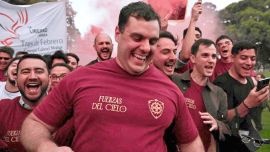Almost as if it were a nice vacation, Alberto Fernández’s “eurotrip” helped him step out from the trenches of domestic politics, with the president receiving praise from his European counterparts and a generalised show of support from some of Argentina’s most powerful allies.
This support, in particular with regards to ongoing negotiations with the International Monetary Fund and the Paris Club over Argentina’s sovereign debt, helps prop up the figure of Economy Minister Martín Guzmán, under a heavy dose of friendly fire over the past several weeks and months. Interestingly, with Cristina Fernández de Kirchner in charge of the Executive given Alberto’s absence, all seemed quiet at the domestic front, despite a series of measures passed by the Kirchnerite-controlled Senate which aimed at further conditioning the economy minister’s ongoing negotiations, which coincidentally or not occurred as Guzmán and Alberto were meeting with IMF chief Kristalina Georgieva, her second-in-command in charge of the Americas, Julie Kozack, and the head of the Paris Club’s boss, French Finance Minister Bruno Le Maire. Not of real concern to Guzmán, at least publicly, as sources brushed off the Kirchnerite idea of not using the IMF’s special drawing rights (SDRs) to pay off debt as nothing more than a statement. Guzmán even had the holy blessing of none other than Pope Francis, who hosted the Columbia University academic along with his boss, the law professor from the Universidad de Buenos Aires, in Vatican City toward the end of the trip.
Much like with Mauricio Macri’s trips abroad, President Fernández seems to have received high marks for his shotgun tour of Western European capitals, palaces, prime ministers and presidents. Starting off in Lisbon, where he met President Marcelo Rebelo de Sousa and Premier Antonio Costa, Fernández jetted off to Europe as a follow up to Guzmán trip in April, seeking support in Argentina’s ongoing restructuring negotiations with the IMF regarding the US$45 billion lent during the financial turbulence in the second half of Macri’s term. Costa, a European socialist, gives Fernández a role model in how to negotiate with the IMF, given Portugal’s successful programme in the wake of the European Financial Crisis which almost toppled the euro back in 2010. Next up came Madrid, where Fernández met with another European socialist, Spanish Prime Minister Pedro Sánchez and held a meeting with King Felipe VI.
From the Iberian Peninsula, the Argentine delegation travelled to the heart of the European continent, first to France and then Italy. It was the main dish of the trip, with a tête à tête with French President Emmanuel Macron and a visit to the Holy See. Obliging, Macron noted that France would support Argentina in its negotiation with the IMF and the Paris Club, while Francis received Fernández and his delegation and pledged political support. More importantly, Jorge Bergoglio threw Fernández and Guzmán a bone, as the Vatican hosted a seminar on debt with the star presence of IMF Managing Director Gerogieva, who finally had a face-to-face meeting with Alberto. Before heading back, Fernández met with Italian Prime Minister “Super” Mario Draghi, the man who is considered to have saved the euro back in 2012 when he said the European Central Bank he led would do “whatever it takes” to save the monetary union.
Beyond the customary diplomatic statements by the European leaders who met the Argentines, the trip will help Alberto both internationally and at home, at least for a little time. It isn’t clear whether this show of support will be enough to help Guzmán succeed in negotiating a long enough grace period with the IMF and the Paris Club, and a substantial reduction in interest expense, but it opens the door for the youngest member of the Cabinet to engage with the US Treasury — which ultimately controls the IMF board, as Donald Trump proved by endorsing the largest-ever emergency loan to the Macri administration — from a stronger bargaining position. The latest information also suggested the Paris Club was willing to offer Argentina some breathing room in upcoming debt payments in order to avoid default and conclude negotiations with the IMF.
Outside of a controversial statement by the Foreign Ministry at the hands of Felipe Solá regarding the ongoing conflict between Israel and Hamas, Alberto’s European experience didn’t even generate a rejection from traditionally vehement members of the opposition and the media. The president’s good chemistry with some of Europe’s most important leaders — he said he would be holding a meeting, probably virtual, with Germany’s Angela Merkel in the coming weeks — shows once again that when he steps into his role as a moderate within the ruling Frente de Todos coalition, he gains ground. It was refreshing to hear Alberto speak of a quick negotiation with the IMF that wouldn’t submit Argentina to crushing austerity, rather than focusing on the ideological and political schism within the ruling coalition, or the consistent antagonism that is also egged on by the Juntos por el Cambio coalition.
With two rounds of midterm elections around the corner, an economy that continues to be stuck in recession and high inflation, and a hard hitting second wave of Covid-19 that has led to new and unpopular restrictions, Argentina is in a tough spot. Disillusionment is growing throughout the population, exacerbated by the continued decrepitude of the political class. Those at the extremes of both coalitions – led by the Kirchnerites on one side and Macri’s hawks on the other – have staked their political future in the continuation and intensification of polarisation, commonly known as “la grieta.” Both Alberto Fernández and his main political opponent, City Mayor Horacio Rodríguez Larreta, received their highest numbers in opinion polls when working together, even forcing the fiery Buenos Aires Province Governor Axel Kicillof to board the train of high marks as they collaborated in the early stages of the pandemic.
It would be nice to continue to see this kind of moderation from Fernández and the opposition. It would also be nice to be daydreaming on the beach, on vacation.



















Comments